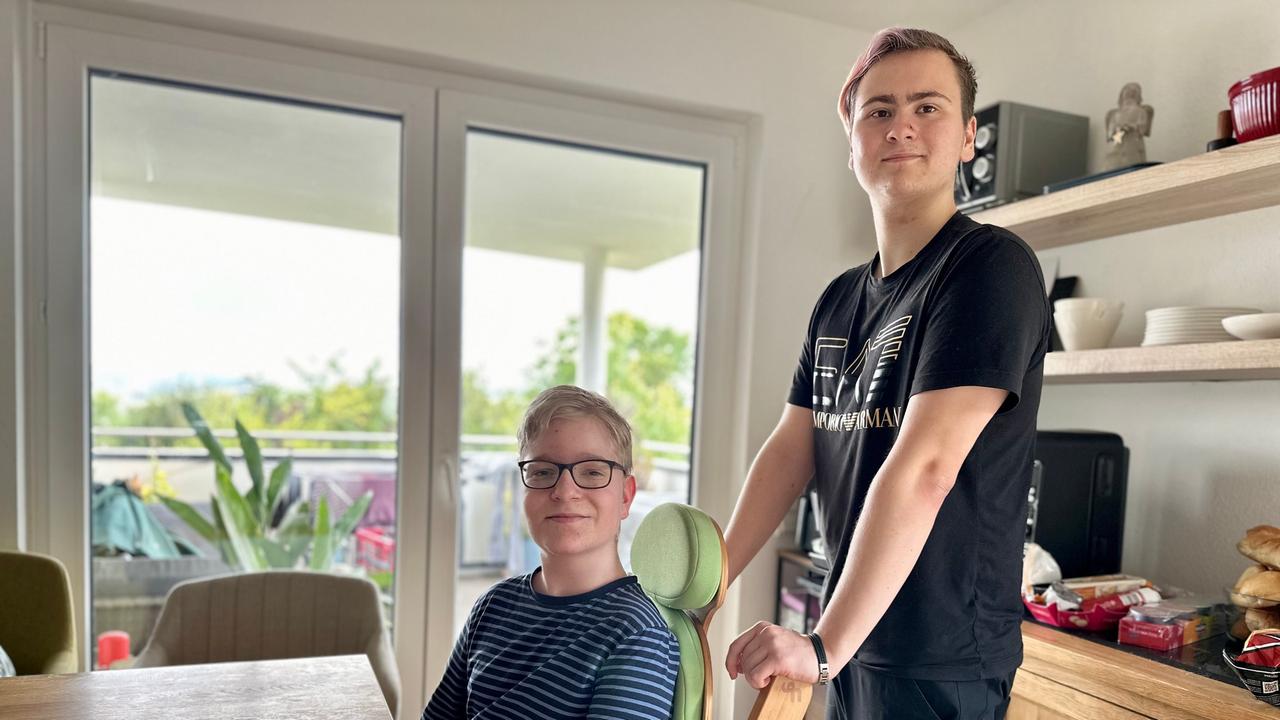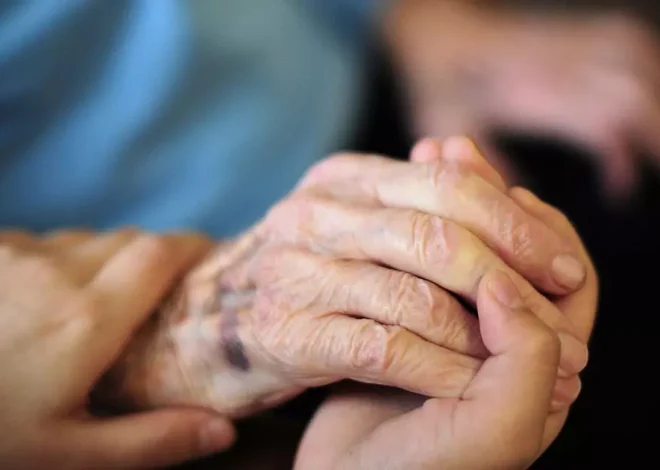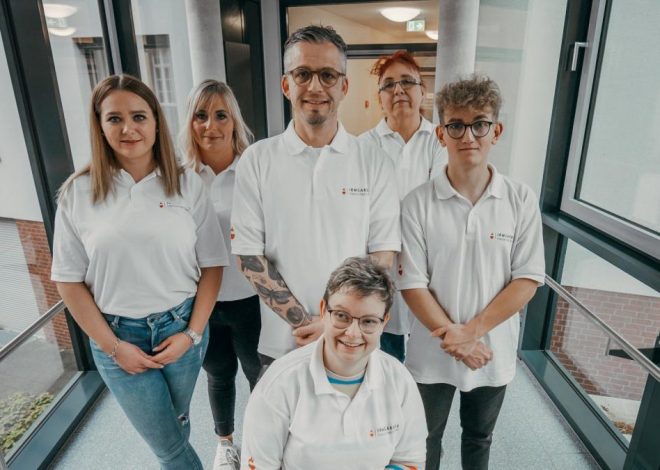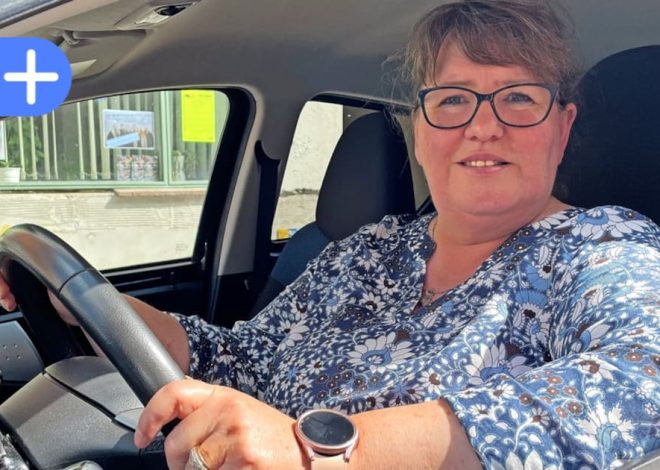
Hessen: Young Carer: When children care for their relatives
Care is no longer just an issue for adults. If someone in a family needs care or is seriously ill, children or young people often have to take on the responsibility of caring for them. What effect does it have on young people to be cared for at such an early age?
Jakob Zellmer carefully pushes his brother closer to the table. Since he was six years old, the 20-year-old has been caring for Daniel together with his older brother and mother. The 14-year-old has been in a wheelchair since he was a toddler. Over the years, more and more tasks have been added. Jakob now gives his younger brother medication, takes him to the toilet or drives him to physiotherapy.
“There were a few things that I had a lot of trouble with at the beginning, like taking him to the toilet or wiping his bottom. But over time, you just grew into it,” says Jakob.
When Daniel’s participation assistant stopped working three years ago and the family couldn’t find a replacement, Jakob took over. He accompanies his brother to the eighth grade of the nearby high school every morning and supports him in class. He is also always within earshot at home in case there is an emergency, because Daniel has epilepsy. “When I panic, Jakob always stays calm,” says his mother Susanne Zellmer proudly.
Care takes place at home
Daniel Zellmer is one of almost 370,000 people in Hesse who need care. Most of them – a good 84 percent in 2021 – are cared for at home by their partners, children, relatives or professional nursing staff, like him. Only a few people in need of care receive inpatient care, for example in a home. Adults do not always take on the care; children and young people often take on care responsibilities.
Young Carers
So-called “young carers” are children and young people, i.e. minors who care for their family members or someone close to them, for example a friend or a neighbor. Their tasks range from helping around the house to caring activities such as washing, dressing or feeding.
The data is scant and research is still in its infancy. Statistically speaking, around one to two children per school class care for a family member. In total, this amounts to around 480,000 children and young people between the ages of 10 and 19 in Germany who belong to the group of young carers.
This is the result of the study “The situation of children and young people as caregivers” by the University of Witten-Herdecke, which the university published on behalf of the Federal Ministry of Health in July 2018. The number of unreported cases is probably higher.
Balancing act between paying attention and growing up
Jakob Zellmer is one of them. Mother and son share the care between them, meticulously coordinating their schedules so that everyone has some free time. “Last year I was away overnight for the first time in fourteen years because the two brothers are doing a great job. I can rely on them,” says mother Susanne.
For Jakob, his childhood was a balancing act between paying attention and growing up. “There was always more responsibility on my shoulders than would have been normal for a child,” he remembers. Over time, he grew into his responsibilities.
The consequences: exhaustion, stress, burnout
Anna Wanka knows that early care responsibilities can have negative effects on both the physical and mental health of young people. The consequences: exhaustion, stress, anxiety or burnout.
The sociologist is researching students with care responsibilities at Goethe University in Frankfurt. “These people are less resilient and we also see very clear institutional disadvantages. These people are more likely to drop out of school, training or university, are employed in low-skilled jobs or are unemployed.” This then has a long effect on the entire course of life, all the way to poverty in old age, says the sociologist.
Often, cases of needing care arise relatively suddenly. Very few people are prepared for this. Very often, the task is initially given to those family members who have the most flexible time. Often, working parents are no longer available. Daughters and granddaughters in particular are particularly often affected, “because women are often seen as being more likely to care,” explains Wanka.
Young carers are invisible to society
Young carers are often invisible to society, slipping into a parental role that they really shouldn’t have. There is a lot of shame on the part of the carers because it is not normal to care at that age.
“In our society, caring for older people is associated with older bodies, death and illness. That’s why young people often don’t dare to share this with anyone,” says Wanka.
More People in need of care until 2055
Forecasts show that the number of people in need of care will increase and there is already a shortage of nursing staff. According to calculations by the Federal Statistical Office, in Hesse alone there will be around 160,000 new people in need of care over the next 30 years, an increase of 43 percent compared to 2021.
Therefore, more information and support services are needed, as well as raising awareness of the situation of young carers, says Susanne Zellmer. “I think it’s important to have a place to go where they can really let off steam and where they will be understood!”
Help others with the “Young Helping Hands” initiative
That’s why Julika Stich founded the “Young Helping Hands” initiative in 2016. The woman from Giessen is doing educational work about young carers and wants to offer the help that she was missing at the time.
Stich was only two years old when her mother was diagnosed with multiple sclerosis. At the age of seven, Stich began to care for her, hoisting her into a wheelchair and at the age of ten was taking care of her intimate hygiene. Her father worked. Only her grandmother and a cousin helped with the care. A nursing service did not come to the house until Stich was already seventeen years old.
Lifelong consequences for young people
The 41-year-old is still struggling with the consequences of the overload. She is undergoing long-term therapy. “I grew up with the fear that my mother was well looked after, with the fear of not being able to do things justice. I still feel this fear and panic sometimes today,” she says.
The “Young Helping Hands” platform provides a nationwide overview of support services and explains the situation of young carers. It acts as a first point of contact. Julika Stich also advises those affected by the phone. She looks individually at what the affected person needs to relieve their stress, puts them in touch with the appropriate agencies and local support services, helps with applications and is always willing to listen.
“We have to look!”
Both affected nurses and former nurses turn to her to talk about their experiences. Stich notices again and again that the barrier is still high. Sometimes it is difficult to even get in touch with those affected. That is why it is all the more important to talk about it and to take a closer look.
Help and advice
Children and young people can talk to qualified counselors about any problem by calling 116 111 or 0800 – 111 0 333.
“I feel safe!”
When things get too much for Jakob Zellmer, he can talk to his friends about it. They are always willing to listen. He holds out a glass of water with a straw to his brother. “I feel safe and well looked after by him. I can’t imagine it being any better,” says Daniel. His gaze wanders to his big brother and he smiles proudly.

Ethel Purdy – Medical Blogger & Pharmacist
Bridging the world of wellness and science, Ethel Purdy is a professional voice in healthcare with a passion for sharing knowledge. At 36, she stands at the confluence of medical expertise and the written word, holding a pharmacy degree acquired under the rigorous education systems of Germany and Estonia.
Her pursuit of medicine was fueled by a desire to understand the intricacies of human health and to contribute to the community’s understanding of it. Transitioning seamlessly into the realm of blogging, Ethel has found a platform to demystify complex medical concepts for the everyday reader.
Ethel’s commitment to the world of medicine extends beyond her professional life into a personal commitment to health and wellness. Her hobbies reflect this dedication, often involving research on the latest medical advances, participating in wellness communities, and exploring the vast and varied dimensions of health.
Join Ethel as she distills her pharmaceutical knowledge into accessible wisdom, fostering an environment where science meets lifestyle and everyone is invited to learn. Whether you’re looking for insights into the latest health trends or trustworthy medical advice, Ethel’s blog is your gateway to the nexus of healthcare and daily living.



